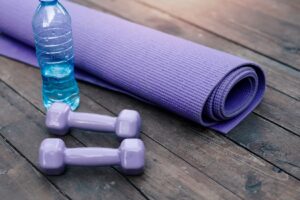Summer time is here! School has ended, or will be ending soon. Students and student-athletes are looking forward to a break, hopefully going on a vacation, having some fun, and so much more. But, for student-athletes, staying in good physical condition is important. You want to enjoy yourself, that is important to do. But you also don’t want to completely let yourself go when it comes to your sport. Staying in good physical, and performance condition is important too! Staying in shape involves a number of factors: regular exercise, proper nutrition, adequate rest, and lifestyle choices. Here are some tips to help you maintain optimal physical condition during off season:
Regular Exercise:
Engage in a mix of cardiovascular, strength training, and flexibility exercises. Aim for at least 150 minutes of moderate-intensity aerobic exercise or 75 minutes of vigorous-intensity aerobic exercise per week. Always warm up before engaging in intense exercise to prepare your body. Include a cool-down session to gradually bring your heart rate back to normal and improve flexibility. Incorporate different types of exercises into your routine, targeting different muscle groups and aspects of fitness. This helps prevent overuse injuries and enhances overall fitness. Make sure you establish a consistent and well-rounded workout routine. Define clear and achievable fitness goals. Break down larger goals into smaller, measurable milestones for a sense of accomplishment.
Nutrient-Rich Diet:
Consume a balanced diet with a variety of nutrient-rich foods. Include fruits, vegetables, lean proteins, whole grains, and healthy fats in your meals. Drink an adequate amount of water throughout the day. Hydration is essential for overall health and optimal physical performance.
Adequate Rest and Recovery:
Ensure sufficient sleep to support recovery and muscle repair. Plan rest days into your workout routine to prevent overtraining and reduce the risk of injury.
Lifestyle Choices:
Schedule regular check-ups with healthcare professionals to monitor your overall health. Address any health concerns promptly. Listen to Your Body. Pay attention to signs of fatigue, pain, or discomfort. Adjust your workout intensity or take a break when needed. Consider incorporating mind-body practices such as yoga or meditation. These practices can enhance mental well-being and complement physical fitness. Try to limit stress through relaxation techniques, hobbies, or activities that bring joy. Chronic stress can negatively impact physical health, so finding effective stress management strategies is important.
In conclusion, stay consistent. Consistency is key to maintaining physical fitness. Establish healthy habits and make exercise a regular part of your lifestyle. Consult with healthcare professionals or fitness experts if you have specific health concerns or if you’re unsure about the best approach for your individual needs.




Recent Comments